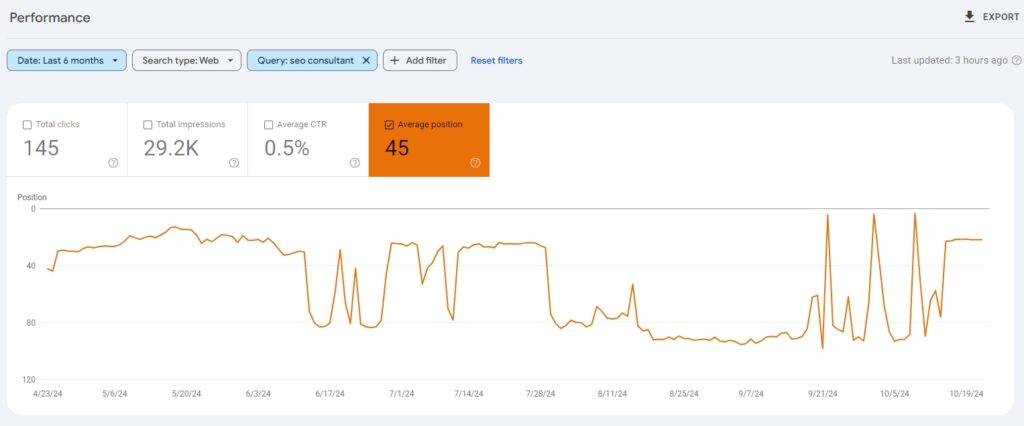If you’ve been in SEO for a while, you’ve undoubtedly read tons of stuff about how the disavow file is no longer needed, or is needed only in the case of a Manual Action (Google-speak for a digital spanking), doesn’t work, Google just uses it to get you to tattle on link sellers, and…you don’t even need it, because Google is really good about automatically ignoring those kinds of links.

In the sea of all manure opinion, there’s some truth, like this article from Marie Haynes, which paints a much more accurate picture of when a disavow file might help/should be used. And this article from SEO legend Bruce Clay, where he says “However, in our experience managing SEO for clients, we’ve found many cases when a low-quality link profile still hurts a website.”
The reality is that yes, Google IS getting much better at spotting and ignoring toxic/spammy links. But it’s far from perfect, as you’re about to see.
First, let me say that the vast majority of people discussing this are focused on whether or not links are being counted against you, like a penalty. But Google is ALSO looking at the content on pages that link to your site as a signal of what you’re good at, or well known and trusted for. And here’s how negative SEO attackers leverage that.
I have a client who’s in the immigration law space. They’re wanting to rank for terms like “H1B visa” etc. In this case, the attacker built thousands of pages–mostly injected into other people’s websites–with the content being a poop-spraying of phrases related to mail order brides. In the middle of this poop avalanche, there’d be a link to the victim’s site. They started ranking and actually getting organic search traffic for mail-order bride terms, and rankings declined for their real keywords.
I have another client who’s in the photography space. Same sort of thing here, except the poopy content was really nasty porn terms. Guess what: photo terms rankings declined, and they started getting traffic for porn terms.
In both cases, by the time we discovered the toxic links, many of the webmasters from the hacked sites had found those injected pages and deleted them. But….Google “remembers” pages that 404 for many, many months. So Google is still considering the content and links from the last time they were able to fetch those pages.
My own consulting site had been attacked a couple of years ago, just days after I outed a bunch of negative SEO farms (coincidence, I’m sure). I saw the nasty links coming in pretty quickly and got after it with disavows.
The vast majority of my clients do NOT come from searches for “seo consultant”–they come from referrals. So I decided to do a little experiment.
I deleted everything in my disavow file and re-uploaded the file, with nothing but a comment line in it. That was May 7, 2024, and at that time, I ranked #23 for “seo consultant” in Incognito mode.
About 40 days later, I fell off the planet for that term, dropping to around #80.
Coincidence? Maybe, I thought, especially with SO MANY changes getting dumped on us by Google this year. So I restored my full disavow file on June 27th.
June 29th, I’m back at #24.
July 9th, I uploaded the empty disavow file again.
July 29th, fell off the planet again.
August 14th, I uploaded a full disavow file again (with a few new domains for some new garbage).
October 22nd, I’m #19. And I’ve stayed there (so far…).
Here’s my Search Console rankings for “seo consultant”:

We all know correlation is not causation. And for some of the transitions, it took over a month to see an impact. I chalked up those delays to Google not necessarily processing a disavow file instantly. Maybe there’s a delay added when a lot of disavow uploading is done–maybe to keep blackhats from testing whether Google is counting links from certain nefarious link schemes. Or maybe some of the topical relevance factors are only calculated a few times a year–maybe in conjunction with some of the Core Updates.
While I’ll readily admit that my little test is far from scientific, and statistically laughable, I do believe I’ve seen enough of a pattern to say that (a) negative SEO links CAN hurt a site’s ranking pretty dramatically, and (b) you CAN successfully fight that with the disavow file.
Just FYI, I changed very little on my site in that time, got almost no new good links, published almost nothing on the blog, except for a few posts on page load time tuning tricks. But it was a relatively stable site in terms of changes that could have had that effect on my rankings for that one term.
UPDATE: I’m pretty sure that in the case of the off-topic hacked pages, even nofollowed links were being considered by Google and hurting my site and my clients’ sites.
